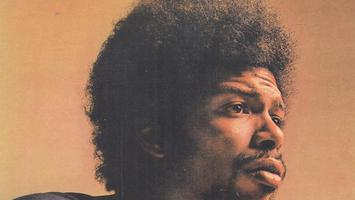On the Anniversary of His Death, Theodore W. Allen’s Analysis Still Resonates
“White supremacy” wrote Allen, is “both the keystone and the Achilles heel of U.S. bourgeois democracy.”
“White identity had to be carefully taught.”
Theodore W. “Ted” Allen (August 23, 1919-January 19, 2005) was an anti-white supremacist, working class intellectual and activist. He developed his pioneering class struggle-based analysis of “white skin privilege” beginning in the mid-1960s; authored the seminal two-volume “The Invention of the White Race” in the 1990s; and consistently maintained that the struggle against white supremacy was central to efforts at radical social change in the United States. Born on August 23, 1919, in Indianapolis, Indiana, he grew up in Paintsville, Kentucky and Huntington, West Virginia (where he graduated from high school), and then went into the mines and became a United Mine Workers Local President. After hurting his back in the mines he moved to New York City and lived his last fifty-plus years in the Crown Heights section of Brooklyn where he worked various jobs including as a postal worker at the Bulk Mail Center in Jersey City, NJ and as a librarian at the Brooklyn Public Library.
“The Invention of the White Race”
Allen’s two-volume “The Invention of the White Race” (1994, 1997: Verso Books, new expanded edition 2012) with its focus on racial oppression and social control is one of the twentieth-century’s major contributions to historical understanding. It presents a full-scale challenge to what he refers to as “The Great White Assumption” — the unquestioning acceptance of the “white race” and “white” identity as skin color-based and natural attributes rather than as social and political constructions. Its thesis on the origin, nature, and maintenance of the “white race” and its understanding that racial slavery in the Anglo-American plantation colonies was capitalist and enslaved Black laborers were proletarians, contains the basis of a revolutionary approach to United States labor history.
On the back cover of the 1994 edition of Volume 1, subtitled “Racial Oppression and Social Control,” Allen boldly asserted “When the first Africans arrived in Virginia in 1619, there were no ‘white’ people there; nor, according to the colonial records, would there be for another sixty years.” That statement, based on 20-plus years of primary research in Virginia’s colonial records, reflected the fact that Allen found no instance of the official use of the word “white” as a token of social status prior to its appearance in a Virginia law passed in 1691. As he later explained, “Others living in the colony at that time were English; they had been English when they left England, and naturally they and their Virginia-born children were English, they were not ‘white.’ White identity had to be carefully taught, and it would be only after the passage of some six crucial decades” that the word “would appear as a synonym for European-American.”
“Allen found no instance of the official use of the word ‘white’ as a token of social status prior to its appearance in a Virginia law passed in 1691.”
In this context he offers his major thesis — that the “white race” was invented as a ruling class social control formation in response to labor solidarity as manifested in the latter (civil war) stages of Bacon’s Rebellion (1676-77). To this he adds two important corollaries: 1) the ruling elite deliberately instituted a system of racial privileges to define and maintain the “white race” and to implement a system of racial oppression, and 2) the consequence was not only ruinous to the interest of African Americans, it was also disastrous for European-American workers.
In Volume II, subtitled “The Origin of Racial Oppression in Anglo-America.” Allen tells the story of the invention of the “white race” and the development of the system of racial oppression in the late seventeenth- and early eighteenth-century Anglo-American plantation colonies. His primary focus is on the pattern-setting Virginia colony, and he pays special attention to the reduction of tenants and wage-laborers in the majority English labor force to chattel bond-servants in the 1620s. In so doing, he emphasizes that this was a qualitative break from the condition of laborers in England and from long established English labor law, that it was not a feudal carryover, that it was imposed under capitalism, and that it was an essential precondition of the emergence of the lifetime hereditary chattel bond-servitude imposed upon African-American laborers under the system of racial slavery.
Allen describes how, throughout much of the seventeenth century, the status of African-Americans was indeterminate (because it was still being fought out) and he details the similarity of conditions for African-American and European-American laborers and bond-servants. He also documents many significant instances of labor solidarity and unrest, especially during the 1660s and 1670s. Of great significance is his analysis of the civil war stage of Bacon’s Rebellion when thousands of laboring people took up arms against the ruling plantation elite, the capital (Jamestown) was burned to the ground, rebels controlled 6/7 of the Virginia colony, and Afro- and Euro-American bond-servants fought side-by-side demanding an end to their bondage.
“Throughout much of the seventeenth century, the status of African-Americans was indeterminate.”
It was in the period after Bacon’s Rebellion that the “white race” was invented as a ruling-class social control formation. Allen describes systematic ruling-class policies, which conferred “white race” privileges on European-Americans while imposing harsher disabilities on African-Americans resulting in a system of racial slavery, a form of racial oppression that also imposed severe racial proscriptions on free African-Americans. He emphasizes that when free African-Americans were deprived of their long-held right to vote in Virginia and Governor William Gooch explained in 1735 that the Virginia Assembly had decided upon this curtailment of the franchise in order “to fix a perpetual Brand upon Free Negros & Mulattos,” it was not an “unthinking decision.” Rather, it was a deliberate act by the plantation bourgeoisie and was a conscious decision in the process of establishing a system of racial oppression, even though it entailed repealing an electoral principle that had existed in Virginia for more than a century.
Key to understanding the virulent racial oppression that develops in Virginia, Allen argues, is the formation of the intermediate social control buffer stratum, which serves the interests of the ruling class. In Virginia, any persons of discernible non-European ancestry after Bacon’s Rebellion were denied a role in the social control buffer group, the bulk of which was made up of laboring-class “whites.” In the Anglo-Caribbean, by contrast, under a similar Anglo ruling elite, “mulattos” were included in the social control stratum and were promoted into middle-class status. This difference was rooted in a number of social control-related factors, one of the most important of which was that in the Anglo-Caribbean there were “too few” poor and laboring-class Europeans to embody an adequate petit bourgeoisie, while in the continental colonies there were ‘’too many’’ to be accommodated in the ranks of that class.
“Any persons of discernible non-European ancestry after Bacon’s Rebellion were denied a role in the social control buffer group.”
In “The Invention of the White Race” Allen challenges what he considers to be two main ideological props of white supremacy — the argument that “racism” is innate (and it is therefore useless to challenge it) and the argument that European-American workers “benefit” from “white race” privileges and white supremacy (and that it is therefore not in their interest to oppose them). These two arguments, opposed by Allen, are related to two master historical narratives rooted in writings on the colonial period. The first argument is associated with the “unthinking decision” explanation for the development of racial slavery offered by historian Winthrop D. Jordan in his “White Over Black: American Attitudes Toward the Negro, 1550-1812.” The second argument is associated with historian Edmund S. Morgan’s “American Slavery, American Freedom: The Ordeal of Colonial Virginia,” which maintains that in Virginia, as slavery developed in the eighteenth century, “there were too few free poor [European-Americans] on hand to matter.” Allen points out that what Morgan said about “too few” free poor was true in the eighteenth century Anglo-Caribbean, but not in Virginia.
“White race” privilege
My article “The Developing Conjuncture and Some Insights from Hubert Harrison and Theodore W. Allen on the Centrality of the Fight Against White Supremacy” (Cultural Logic, 2010) describes key components of Allen’s analysis of “white race” privilege. It explains that as he developed the “white race” privilege concept, Allen emphasized that these privileges were a “poison bait” (like a shot of “heroin”) and he explained that they “do not permit” the masses of European American workers nor their children “to escape” from that class. “It is not that the ordinary white worker gets more than he must have to support himself,” but “the Black worker gets less than the white worker.” By, thus “inducing, reinforcing and perpetuating racist attitudes on the part of the white workers, the present-day power masters get the political support of the rank-and-file of the white workers in critical situations, and without having to share with them their super profits in the slightest measure.”
As one example, to support his position, Allen provided statistics showing that in the South where race privilege “has always been most emphasized . . . the white workers have fared worse than the white workers in the rest of the country.”
“The power masters get the political support of the rank-and-file of the white workers in critical situations, and without having to share with them their super profits.”
Probing more deeply, Allen offered additional important insights into why these race privileges are conferred by the ruling class. He pointed out that “the ideology of white racism” is “not appropriate to the white workers” because it is “contrary to their class interests.” Because of this “the bourgeoisie could not long have maintained this ideological influence over the white proletarians by mere racist ideology.” Under these circumstances white supremacist thought is “given a material basis in the form of the deliberately contrived system of race privileges for white workers.” Thus, writes Allen, “history has shown that the white-skin privilege does not serve the real interests of the white workers, it also shows that the concomitant racist ideology has blinded them to that fact.”
Allen added, “the white supremacist system that had originally been designed in around 1700 by the plantation bourgeoisie to protect the base, the chattel bond labor relation of production” also served “as a part of the ‘legal and political’ superstructure of the United States government that, until the Civil War, was dominated by the slaveholders with the complicity of the majority of the European-American workers.” Then, after emancipation, “the industrial and financial bourgeoisie found that it could be serviceable to their program of social control, anachronistic as it was, and incorporated it into their own ‘legal and political’ superstructure.”
Allen felt that two essential points must be kept in mind. First, “the race-privilege policy is deliberate bourgeois class policy.” Second, “the race-privilege policy is, contrary to surface appearance, contrary to the interests, short range as well as long range interests of not only the Black workers but of the white workers as well.” He repeatedly emphasized that “the day-to-day real interests” of the European-American worker “is not the white skin privileges, but in the development of an ever-expanding union of class-conscious workers.” He emphasized, “‘Solidarity forever!’ means ‘Privileges never!'” He elsewhere pointed out, “The Wobblies [the Industrial Workers of the World] caught the essence of it in their slogan: ‘An injury to one is an injury to all.'”
“‘Solidarity forever!’ means ‘Privileges never!'”
Throughout his work Allen stresses that “the initiator and the ultimate guarantor of the white skin privileges of the white worker is not the white worker, but the white worker’s masters” and the masters do this because it is “an indispensable necessity for their continued class rule.” He describes how “an all-pervasive system of racial privileges was conferred on laboring-class European-Americans, rural and urban, exploited and insecure though they themselves were” and how “its threads, woven into the fabric of every aspect of daily life, of family, church, and state, have constituted the main historical guarantee of the rule of the ‘Titans,’ damping down anti-capitalist pressures, by making ‘race, and not class, the distinction in social life.'” That, “more than any other factor,” he argues, “has shaped the contours of American history — from the Constitutional Convention of 1787 to the Civil War, to the overthrow of Reconstruction, to the Populist Revolt of the 1890s, to the Great Depression, to the civil rights struggle and ‘white backlash’ of our own day.”
Strategy
Allen also addressed the issue of strategy for social change. He emphasized, “The most vulnerable point at which a decisive blow can be struck against bourgeois rule in the United States is white supremacy.” He considered “white supremacy” to be “both the keystone and the Achilles heel of U.S. bourgeois democracy.” Based on this analysis Allen maintained, “the first main strategic blow must be aimed at the most vulnerable point at which a decisive blow can be struck, namely, white supremacism.” This, he argued, was the conclusion to be drawn from a study of three great social crises in U.S. history – “the Civil War and Reconstruction, the Populist Revolt of the 1890s, and the Great Depression of the 1930s.” In each of these cases “the prospects for a stable broad front against capital has foundered on the shoals of white supremacism, most specifically on the corruption of the European-American workers by racial privilege.”
Groundbreaking Analysis Continues to Grow in Importance
Ted Allen died on January 19, 2005, and a memorial service was held for him at the Brooklyn Public Library where he had worked. Then on October 8, 2005, his ashes, as per his request, were spread in the York River (near West Point, Virginia) close to its convergence with the Pamunkey and Mattaponi Rivers – the location where the final armed holdouts, “Eighty Negroes and Twenty English,” refused to surrender in the last stages of Bacon’s Rebellion.
Allen’s historical work has profound implications for American History, African-American History, Labor History, Left History, American Studies, and “Whiteness” Studies and it offers important insights in the areas of Caribbean History, Irish History, and African Diaspora Studies. With its meticulous primary research, equalitarian motif, emphasis on the class struggle dimension of history, and groundbreaking analysis his work continues to grow in influence and importance.
Those interested in learning more of the work of Theodore W. Allen can see: 1) writings, audios, and videos by and about Theodore W. Allen; 2) comments from scholars and activists and Table of Contents for “The Invention of the White Race Vol. I: Racial Oppression and Social Control”; 3) comments from scholars and activists and Table of Contents on “The Invention of the White Race Vol. II: The Origin of Racial Oppression in Anglo-America” [Verso Books]; and “The Developing Conjuncture and Some Insights from Hubert Harrison and Theodore W. Allen on the Centrality of the Fight Against White Supremacy.”
Dr. Jeffrey B. Perry is the author of “Hubert Harrison, The Voice of Harlem Radicalism, 1883-1918” (Columbia University Press, 2008) and “Hubert Harrison: The Struggle for Equality, 1918-1927” (Columbia University Press, November 2020). He is also the editor of: “A Hubert Harrison Reader” (Wesleyan University Press, 2001); Theodore W. Allen’s “The Invention of the White Race” Vol. 1: “Racial Oppression and Social Control” (New Edition, Verso Books 2012); Theodore W. Allen’s “The Invention of the White Race” Vol. 2: “The Origin of Racial Oppression in Anglo-America” (New Edition, Verso Books 2012); and Hubert H. Harrison, “When Africa Awakes: The ‘Inside Story’ of the Stirrings and Strivings of the New Negro in the Western World” (New Edition, Diasporic Africa Press, 2015).
COMMENTS?
Please join the conversation on Black Agenda Report's Facebook page at http://facebook.com/blackagendareport
Or, you can comment by emailing us at comments@blackagendareport.com



















